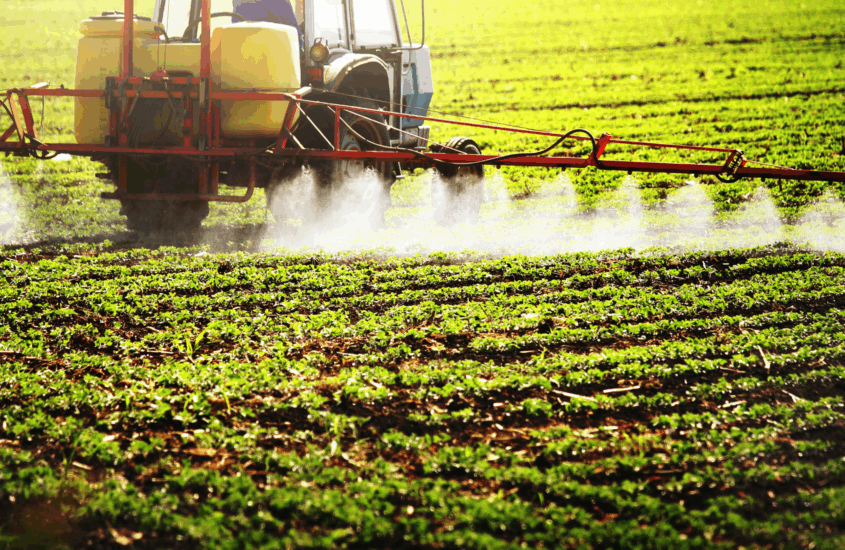In Our Children’s Food: Thirty Years Since FRONTLINE’s Groundbreaking Report
AmericanMom Team |
In 1993, FRONTLINE aired a powerful exposé titled In Our Children’s Food. Hosted by Bill Moyers, this hour-long episode documented the 30 years of failure on the part of “experts” when it came to investigating and testing the pesticides used on America’s food supply. It exposed not just the alarming risks of pesticides in American agriculture, but the bureaucratic delays, political obstructions, and scientific neglect that allowed toxic residues to remain on the food most commonly consumed by children.
Over 30 years later, not much has changed. The same subject—pesticides on our food—is permeating the conversation. Many of those concerns still hold true, which has led to a rising movement of mothers. Armed with discernment and conviction, women are refusing to feed their families blindly and trust corporations who have a history of hiding behind red tape, protective clauses, and endless money. Instead, they’re demanding answers, reclaiming responsibility, and helping to shape the next wave of change.
Then vs. Now: What’s Legally Allowed in Our Food?
It seems no one wants to talk about it, but we are not healthy. As a society, we have an embarrassing ranking on the world stage when it comes to obesity and heart disease. What’s more, allergies, ADHD, neurodivergent syndromes, cancers, and other chronic and autoimmune diseases seem to be on the rise. We certainly haven’t lessened the influence and quantity of doctors in this country. And Lord knows pharmaceutical companies aren’t hurting. So there has to be another source. Some it lifestyle, but most it food—something we all consume. What is legally allowed in our food that is directly impacting our health?
Pesticide Tolerances
In the U.S., pesticide residues are regulated by the Environmental Protection Agency (EPA), which sets “tolerance levels”—the maximum legal amount of pesticide residue allowed on a specific food.
As of 2025, over 9,500 pesticide tolerances are in effect. The majority of studies conducted only studied the impact on adult males and their consumption pattern which means we have no idea how much smaller bodies, those of children, will tolerate these poisons. This is all despite early warnings from the National Academy of Sciences in the 1990s that children face greater risks due to their size, development stage, and eating habits. Thirty years ago, and for at least thirty years before that, no one knew. Today, still no one knows.
Systemic Pesticides Are Still Common
Many of today’s chemicals are systemic, meaning they’re absorbed into the plant and cannot be rinsed off. Even soaking your produce in organic apple cider vinegar won’t save you from that peach that absorbed Roundup in the soil.
The things we do know about the pesticides on our food make this fact terrifying. The common systemic pesticides in our food today include Glyphosate which is linked to potential cancer risk, and is allowed up to 5 ppm in our corn and 20 ppm in our soy. Neonicotinoids are another common pesticide and connected to endocrine disruption, throwing off your hormones which determine everything in your body. Finally, we have Captan which is still permitted on 74 food crops despite being directly linked to cancer in animal studies.
The Carrot Still Carries Chemicals
A focus of the 1993 In Our Children’s Food documentary is carrots. Bill Moyers reported that carrots could contain residues from 40 different pesticides, including 8 potential carcinogens. Today, the story hasn’t changed much.
The FDA’s 2023 Pesticide Monitoring Report showed 77% of conventional produce tested had detectable residues while only 26% of organic produce did. We say “only” but 26% is still far too much. That means the carrot still carries chemicals and even if you’re trying to do your absolute best to reduce your toxin load and give your children real, pure, nutritional, and healthy food you’re still failing on some level.
But it’s not your fault.
Are Children Still at Risk?
Absolutely. Yes, without a doubt, yes! It’s a fact that children eat more fruits and vegetables per pound of body weight than adults. What’s more, we tend to give them more processed foods like pre-made purees starting at six months old or before, boxed mac n’ cheese, cereals, etc. Even if these things claim to be organic, there’s still no guarantee that they are 100% pesticide free.
Children’ s immune, neurological, and hormonal systems are still under construction. Endocrine disruptors, carcinogenic substances, and neurotoxins can only be combatted so much by their developing bodies.
In a 2022 study found in Environmental Health Perspectives, researchers found that low-dose, repeated pesticide exposure is linked to ADHD, autism spectrum disorders, decreased IQ, and behavioral changes. This is backed up by other studies conducted by organizations like the NIH, meaning the government is well aware of the damages.
The “experts” may deny it, but parents, you trust and know the evidence of your eyes. These products, sprayed on everything, put our children at risk and harm their health and mental wellbeing. Period.
Who’s Testing This Stuff?
One of the most damning parts of FRONTLINE‘s 1993 documentary was the revelation that pesticide manufacturers were allowed to test and submit their own safety data to the EPA. And they still are. Though these tests are reviewed by the EPA, and some are rejected and redone, it does not change the fact that the pesticide company is submitting their own data, making it incredibly biased in favor of the pesticides.
What’s even worse is that new pesticides are often approved under a “conditional registration” process, meaning chemicals can be sprayed on our food before all safety data, even the incredibly biased data, is complete.
How can we trust anything regarding these chemicals when the people who make them, and have something to lose if they are not approved, are submitting the data and doing the “research”? We can’t and we shouldn’t.
Pesticides Banned or Restricted Since 1993
Since 1993, we’ve only banned one highly toxic substance. Obviously, that barely makes a dent.
| Chemical | Status as of 2025 |
| DDT | Banned (since 1972) |
| Captan | Still allowed on many crops |
| Chlorpyrifos | Banned for food use in 2021 |
| Paraquat | Still allowed, heavily restricted |
| Atrazine | Still permitted in U.S.; banned in the EU |
| Glyphosate | Still allowed; under renewed legal, health scrutiny |
Feeding Children in the Age of Chemicals
For today’s mothers, the minefield of feeding a child has become a point of stress. What should be an act of love is becoming an act of resistance as moms fight harder and harder to take down the food systems that do not take health or nutrition seriously—despite their control over the food.
A single serving of salad could legally contain low doses of 5–10 pesticides—none illegal or lethal on their own—but possibly dangerous in combination. Cleaning up your child’s food is beyond important as we see modern science confirm what mothers have instinctively known for decades: what we feed our children affects their brains, guts, immune system, and chances of avoiding chronic illness and cancers.
In the face of institutional failure, moms are returning to something older and more deeply rooted: common sense.
MAHA: The Mother-Led Movement
RFK Jr. might have coined the term, but the Make America Healthy Again (MAHA) movement is ultimately mother-led. Because for moms, health isn’t just about supplements and detoxes, it’s a revolt against outsourced responsibility and fight for the health of our nation’s children.
Less MAHA and more ‘make food real and healthy again’—mothers are rethinking the mainstream medical advice that too often minimizes the role of food in healing and health. They’re advocating against schools serving ultra-processed government-subsidized meals. And they are laughing in the faces of agencies that tell them “Trust us—it’s safe.”
Moms in the MAHA/make food real again movement are doing what the EPA, USDA, and FDA are too cowardly and corrupt to do and encourage. Moms are growing their own food, choosing pasture-raised meats, learning preservation and canning, and educating their kids on food labels and critical thinking.
They’re reclaiming the kitchen as the clinic and the dinner table as the battleground for their children’s health.
Did You Know?
Pesticides have been proven to disrupt the gut microbiome, interfere with hormone signaling, and mimic estrogen or suppress androgens. These development and health altering effects can cause lasting, life-long damage.
What You Can Do
First and foremost: remember you are not at fault and you don’t have to be perfect! All of this information is incredibly scary. But the truth needs to be told and understood in order for us to move forward and make improvements to this vital part of our lives. We’re sorry if we’ve scared you, but there is plenty that you can do.
You are not a bad mom for not being able to afford all organic produce and antibiotic-free meats.
You are not a bad mom for questioning authority.
You are not a bad mom for choosing raw milk or local beef over subsidized, pasteurized alternatives.
You are not a bad mom for denying sugary, heavily dyed, highly processed foods to your children.
This isn’t guilt, it’s discernment. And it’s powerful.
Instead, be proactive and take small steps that fit into your budget and abilities.
- Start small by using the EWG’s Dirty Dozen list to prioritize organic.
- Wash all produce thoroughly under running water (rinse for 15-20 seconds) or soak in water with baking soda or vinegar. (Though it won’t remove systemic pesticides, it’s a start!)
- Cook meals from scratch as much as possible so you know all the ingredients going into your food.
- Buy meat and produce from local farms, farmer’s markets, and regenerative agriculture. And ask questions: Do you use pesticides? Do you use antibiotics?
- Vote with your dollar and demand transparency from brands and retailers. If this means writing a company and telling them you’re no longer buying their products because they now use pesticides, antibiotics, certain preservatives, bio-engineered ingredients, etc. then do it! They need to know we won’t accept their cut corners and Bill Gates buyouts.
Frontline on the Front Porch
The 1993 FRONTLINE documentary lit a fuse. A slow-burning one, but a fuse all the same. Thirty years later, the explosion hasn’t happened, but the pressure has built, and moms are sick of being gaslit, lied to, and treated as ignorant. The sheer length of time — more than 60 years — that it’s taken for this to truly kick off proves we are at a tipping point and our wellbeing as a nation can only take so much more. Change will not come from Congress or the EPA. We cannot rely on legislatures and certainly not NGOs. It can only come from moms and angry Americans who refuse to participate. Health starts in the pantry, the school lunchbox, the front porch and the gardens being built in backyards across the country. We cannot let another thirty years go by waiting for the someone else to do something. For the first time since 1993 and FRONTLINE’s documentary we are actually starting to believe that change is coming.
Because when government regulators stall, it’s mothers who move.






